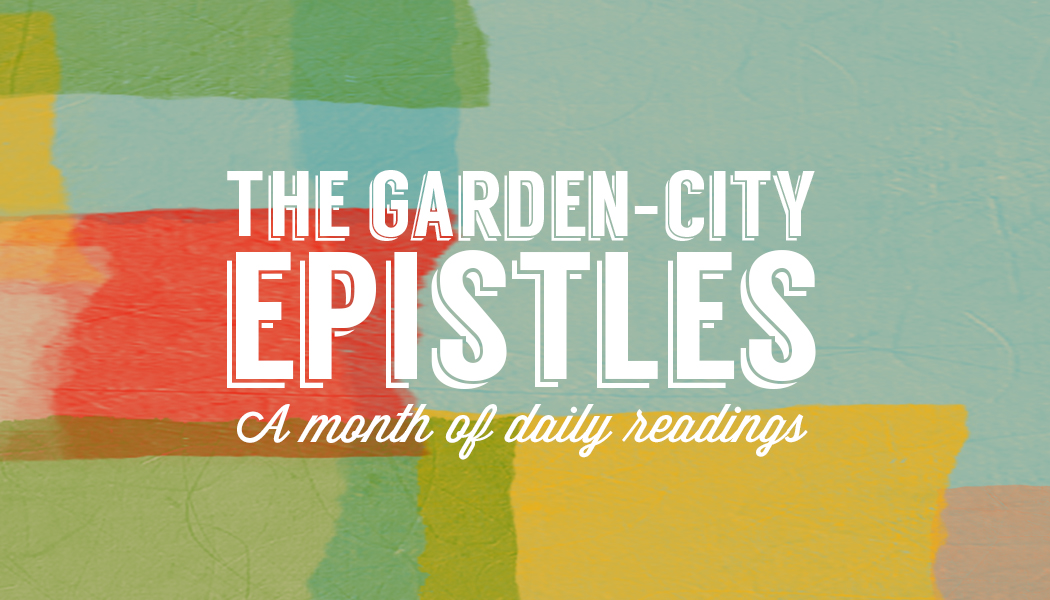I wrote this letter for Glenn Yamakawa, who thinks everything through to its furthest and fullest conclusion.
You’re a thinker. You like to puzzle things out and see how they’re meant to fit together. You’re smart, smarter than you think, and you take seriously God’s requirement to gain wisdom and understanding.
So when I tell you the city is a metaphorical way of denoting our cooperative work with God, I think you’ll already have a good grasp of what that means. You’ll recall the earliest chapters of the Bible that describe how God placed our spiritual ancestors in the garden of Eden, just as you’ll recall that Eden is somehow transformed at the end of Revelation into a garden-city. Based on God’s instructions to Adam and Eve, we know that the work of developing and expanding Eden into its urban counterpart is a decidedly human task.
He gave us a garden, but requires from us a city.
I feel somewhat like a broken record, playing back the same basic information on a loop. But the truth is we need the reminder. It takes a long time to grow a city. It takes a long time to incubate a dream, especially the dream of the whole earth covered with God’s glory.[1] In the middle of our lives and the middle of our work we cannot lose sight of why we’re doing the things we’re doing. We’re not simply working, but working as unto the Lord,[2] striving to ensure that all our efforts point toward the city “whose builder and maker is God.”[3]
I’ve mentioned previously that the city is but one of three dominant God-space metaphors in scripture, along with the Kingdom and Heaven, and there are some good reasons to keep all three in mind. If you were to press me about the dangers of overemphasizing the city I’d say there were two.
First, the city-as-cooperation metaphor can falsify our confidence in ourselves convincing us that good things will only happen because of our contributions. The city can overplay humanity’s importance in God’s world, sometimes causing us to dismiss God’s involvement entirely. This is why I’ve taken pains to reinforce the fact that the cultural mandate[4] should be understood as God’s gameplan for God’s people in God’s place promising God’s blessing. It’s all God’s, but he likes to share.
The second danger inherent in the city-as-cooperation metaphor involves falling in love with our earthly cities and becoming blind to the fact that they are in rebellion against God. In my survey of literature on the topic of city theology I saw this disturbing trend go entirely uninterrupted. People from New York claimed God was pleased with their city because it was impressive; people from Los Angeles claimed God was at work in their city because it was awesome; people from Chicago claimed God was evident in their city because it was green. But I never read any literature from people who acknowledged their cities were crummy, broken down, ramshackle excuses for civic centers yet loved them anyway. Nobody ever spoke about how they loved their city because God had given them that love; no, they loved their towns because their towns were lovely.
And that, my friend, is disappointing.
Of course we love San Francisco and Valletta and Berlin. Who wouldn’t? That’s not the issue. The issue of our involvement in our earthly cities is whether we can bring the light of God into a city enthralled by lesser lights. The question is whether we can lure them away from LEDs and out into the sun.
Never forget that the city is a metaphor. As soon as we focus more on the metaphor than the cooperative effort to which it refers, we run the risk of changing teams and falling in love with the city of man.
[1] Isaiah 6.3.
[2] Ephesians 6.7.
[3] Hebrews 11.10.
[4] Genesis 1.26-28.
fossores
Related posts
Categories
Category Cloud
Tag Cloud
Recent Posts
- Victors and Victims November 6, 2018
- 3 Hacks for Happiness October 29, 2018
- Hope Against Death September 20, 2018
- The Shape Of The Cross September 19, 2018


